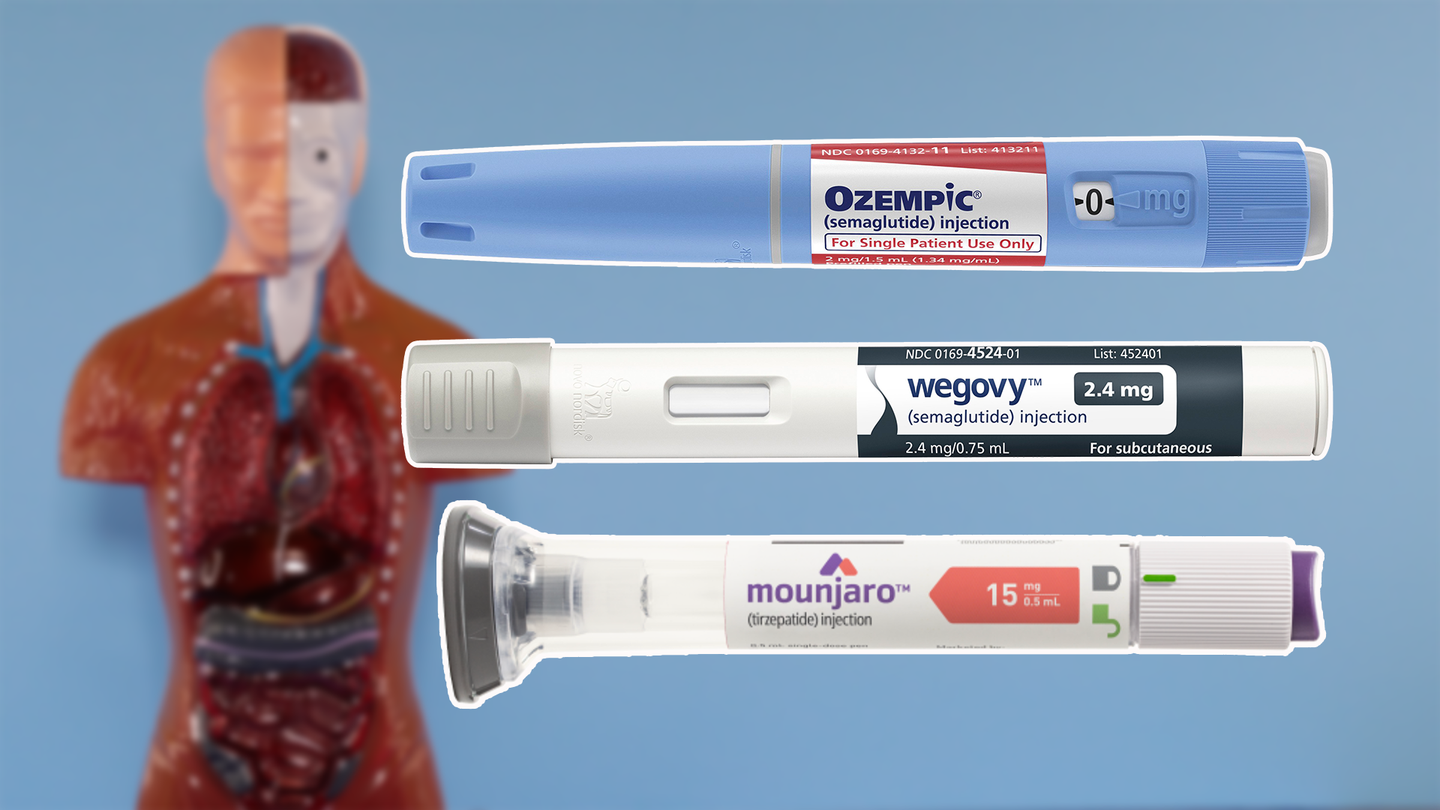Gastric sleeve or Ozempic: Which is a better long-term strategy for weight loss?
The study utilized a Markov cohort model to evaluate the outcomes of a theoretical group of patients within the U.S. healthcare system.

The study utilized a Markov cohort model to evaluate the outcomes of a theoretical group of patients within the U.S. healthcare system. (CREDIT: Creative Commons)
A recent study published in JAMA Network Open reveals that Endoscopic Sleeve Gastroplasty (ESG), a non-surgical weight loss procedure, proves to be more economically advantageous over a five-year period compared to using semaglutide, the active component in Ozempic, Wegovy, and similar weight loss medications.
ESG functions by reducing the stomach's size through a minimally invasive procedure. This involves the insertion of a suturing device down the throat and into the stomach, where it folds and sutures the stomach's sides. It's important to note that ESG differs from gastric sleeve surgery, which involves the removal of a significant portion of the stomach.
Conducted from September 1, 2022, to May 31, 2023, the study utilized a Markov cohort model to evaluate the outcomes of a theoretical group of patients within the U.S. healthcare system. These patients had a body mass index (BMI) falling within the range of 35 to 39.9, placing them within the category of obesity (BMI of 30 or higher).
Initially, over the course of one year, the study found that ESG was not as cost-effective as semaglutide. However, the dynamics shifted thereafter.
The research projections indicated that implementing "the semaglutide strategy" would result in an additional cost of $33,583 compared to the ESG approach over a five-year period. Moreover, approximately 20% of individuals utilizing semaglutide were expected to discontinue the medication due to intolerance or other factors, leading to potential weight regain, as highlighted in the study.
Overall, the researchers concluded that ESG emerged as a cost-effective strategy, providing both greater weight loss and financial savings. They emphasized that to become a cost-competitive alternative, the annual cost of semaglutide would need to be reduced by threefold, from $13,618 to $3,591.
Dr. Marina Kurian, President of the American Society for Metabolic and Bariatric Surgery, commented on the reality of the situation, stating, "That’s the reality -- everybody just wants the meds but in truth the meds are expensive."
Related Stories
Dr. Kurian, whose physician members specialize in performing gastric sleeve and other weight loss procedures, highlighted the challenge of significant weight regain upon discontinuation of medications, contrasting it with the general trend post-surgery.
Reflecting on the cost analysis, Dr. Kurian pointed out that weight loss surgeries often achieve cost recoupment or become cost-neutral over a period of two to three years, a statement not directly tied to the study but relevant to the broader discussion on weight loss strategies.
Originally developed for the treatment of type 2 diabetes, drugs containing semaglutide gained attention for their weight loss benefits. Semaglutide, administered via weekly injections, stimulates insulin release in response to elevated blood sugar levels, thereby reducing sugar production by the liver.
Results of 1-Way Sensitivity Analyses Performed Over a 5-Year Time Horizon. (CREDIT: JAMA Network Open)
Medical experts emphasize the importance of lifestyle modifications, including dietary changes, regular exercise, and other habits, to maintain weight loss achieved through ESG or semaglutide medications.
In conclusion, while semaglutide proves effective for weight loss, the study underscores its long-term economic impracticality compared to ESG, which remains a cost-saving option.
Details of two separate mid-stage clinical trials of retatrutide were released in esteemed scientific journals, the New England Journal of Medicine (NEJM) and The Lancet. Researchers and healthcare professionals around the world avidly digested the information, marveling at the significant findings that have emerged from these trials.
At the American Diabetes Association conference in San Diego, the gathered medical professionals - many of them leaders in their fields - reacted with astonishment to the clinical outcomes of retatrutide. Hundreds of trial participants, suffering from obesity and diabetes, demonstrated rapid weight loss and substantial improvements in blood sugar, cholesterol, and blood pressure levels under the influence of the investigational drug.
Dr. Ania Jastreboff, director of the Yale Obesity Research Center and co-author of the NEJM paper, was one of the many taken aback by the drug's performance. "We have not seen results like this before," she stated, her surprise echoing through the conference hall.
As news of retatrutide's results disseminated throughout the conference, a wave of consensus swept over the attendees. Many began to consider the drug as a potential game-changer in both weight loss and Type 2 diabetes management. The global medical community, represented at the conference, reacted with palpable excitement - an ovation of claps and gasps met the announcement of the trial results.
Dr. Carel Le Roux from University College Dublin, an obesity researcher not involved in the studies, succinctly encapsulated the medical community's sentiment during a press conference, saying, "This raises the bar. This is way beyond my wildest dreams."
Retatrutide bears similarities to Ozempic, Wegovy, and Mounjaro; it is a once-weekly injection of hormones that regulate hunger, thereby promoting feelings of satiety and decreasing appetite. But, retatrutide surpasses these predecessors in one critical aspect.
Bodyweight decreased dose dependently with retatrutide at 36 weeks by 3·19% (SE 0·61) for the 0·5 mg group, 7·92% (1·28) for the 4 mg escalation group, 10·37% (1·56) for the 4 mg group, 16·81% (1·59) for the 8 mg slow escalation group, 16·34% (1·65) for the 8 mg fast escalation group, and 16·94% (1·30) for the 12 mg escalation group, versus 3·00% (0·86) with placebo and 2·02% (0·72) with 1·5 mg dulaglutide. (CREDIT: The Lancet)
While Ozempic and Wegovy only mimic one hunger-regulating hormone, GLP-1, and Mounjaro two hormones, GLP-1 and GIP, retatrutide is a single molecule that mimics three different hunger-regulating hormones: GLP-1, GIP, and glucagon. This tripartite hormonal action, colloquially referred to as the "triple G" effect by scientists at the conference, seems to exert a more potent effect on a person's appetite and food satisfaction.
Dr. Jastreboff described the patients' experiences as a newfound "freedom," liberated from the arduous task of obsessively controlling their diet for the remainder of their lives.
In the trial published in the NEJM, patients with obesity received the highest weekly dose of retatrutide (12 mg) and lost an average of 58 pounds over 11 months. Significantly, their weight continued to decrease even after the trial ended. This suggests that longer and larger trials, yet to be completed, may reveal even more impressive weight loss outcomes. Remarkably, every participant on the highest dose of retatrutide lost at least 5% of their body weight, with a quarter of those losing 30% or more.
Efficacy was analysed in all randomly assigned, except inadvertently enrolled, participants, and safety was assessed in all participants who received at least one dose of study treatment. (CREDIT: The Lancet)
In a related study on retatrutide's effects on Type 2 diabetes patients, published in The Lancet, patients lost around 17% of their body weight over nine months. This is a groundbreaking achievement as it's generally more challenging for individuals with Type 2 diabetes to lose weight compared to those suffering solely from obesity.
Side effects observed with retatrutide mirrored those seen with Ozempic and Mounjaro, including nausea, diarrhea, constipation, and vomiting.
Lead Lancet study author Dr. Julio Rosenstock from the University of Texas Southwestern Medical Center was impressed. He declared, "This is a real wow. Not a single drug has achieved 17% — and you ain't seen nothing yet."
Schematic Depiction of the Pleiotropic Benefits of Dual Glucose-Dependent Insulinotropic Polypeptide (GIP)/Glucagon-Like Peptide-1 (GLP-1) Receptor Agonist Therapy in Type 2 Diabetes Mellitus. (CREDIT: Trends in Endocrine & Metabolism)
His trial, much like Dr. Jastreboff's, ended while patients were still shedding pounds. Given more time, Rosenstock anticipates many of these patients with diabetes would achieve a 20% weight loss with this medication. Crucially, around a third of the patients with Type 2 diabetes reverted to normal blood sugar levels while on the drug.
Despite the promise retatrutide holds, its commercial availability is several years away. Larger and longer phase 3 clinical trials are needed before the U.S. Food and Drug Administration can evaluate the drug for public use. Experts predict this process will last until at least the end of 2025. Yet, the medical community waits with bated breath as retatrutide has the potential to revolutionize the approach to obesity and diabetes treatment.
For more science and technology stories check out our New Innovations section at The Brighter Side of News.
Note: Materials provided above by The Brighter Side of News. Content may be edited for style and length.
Like these kind of feel good stories? Get the Brighter Side of News' newsletter.
Joshua Shavit
Science & Technology Writer | AI and Robotics Reporter
Joshua Shavit is a Los Angeles-based science and technology writer with a passion for exploring the breakthroughs shaping the future. As a contributor to The Brighter Side of News, he focuses on positive and transformative advancements in AI, technology, physics, engineering, robotics and space science. Joshua is currently working towards a Bachelor of Science in Business Administration at the University of California, Berkeley. He combines his academic background with a talent for storytelling, making complex scientific discoveries engaging and accessible. His work highlights the innovators behind the ideas, bringing readers closer to the people driving progress.



